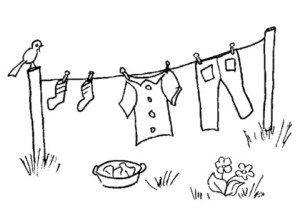“If it hurts, it must be good for you” or so the saying went for years. Fortunately that myth was debunked when cooler heads prevailed and proved that pain was not a good thing. Along the same thinking, and with no conclusive evidence to support their claims of protecting property values, we watched as more and more restrictions, rules and covenants were added to the already long list of what homeowners could not do in their own homes. This canard was repeated often enough so many people started to accept it as gospel. Well, it appears the pendulum may be swinging back the other way. New legislation is prohibiting HOAs from banning such things as clotheslines, solar panels and flags. These were the iconic red flags that were said to lead to “ghetto living”.
Vicki MacHale joins us On The Commons this week. Vicki has 22 years experience in property management in California. She recently wrote an article about the laws stripping HOAs of some of the powers they had. She very accurately titled her article
“The Sky is Falling”. She writes about the reactions from fellow colleagues and board members to the new laws as they are enacted and assures them that the sky really is not falling. Over the years, she has watched as choice in housing has been eliminated. No longer do housing consumers get to decide how to live. Vicki calls this the beige-ing of America. We’ll talk to Vicki and understand what she means by the beige-ing of America and we’ll learn about some of the laws enacted in California removing powers from HOAs. We’ll find out if the world really will come to an end or will this trend will lead to building real communities instead of war zones.


Excellent interview with several good points:
Buyers don’t have non-HOA choices.
Design of communities doesn’t offer needed functionality for real homeowners.
Municipal and County governments are just as culpable as developers, perhaps even moreso, because they enable or even require higher densities and reduced standards for construction of common areas and infrastructure.
Ultimately, consumers (homeowners and also tenants) are paying higher prices to purchase, to lease, and to maintain housing AND the surrounding community, even beyond the boundaries of the Association, to some extent.
So…since consumers are paying for infrastructure anyway, why add the fourth layer of government (Mandatory Associations)? How is this saving money in the long run? It’s terribly inefficient to have thousands of different associations in each state attempting to maintain their own infrastructure (and provide their own security or pay extra for police patrols), when, if tax dollars were consolidated in lieu of HOA assessments, municipal and county governments could achieve economies of scale.
And why should homeonwers have to pay to insure and maintain unusuable conservation land and storm drainage basins, for example? The HOA also creates other liabilities because now homeowners must also pay for any lawsuits — because HOAs can sue or be sued for a number of reasons. This is a financial liablity that is almost nonexistent for owners of non-HOA property.
Also…not only can Realtors not discuss the demographics of a community, but, if the community is gated, buyers cannot freely access the community to drive around at different times of the day or night to get a sense for what it would be like to live there.
And…every community transitions over time (unless specfically designated as 55+ association). The small children of today are teenagers in a decade. Working families become empty nesters. Older owners might sell and downsize, and then new couples move in and many of them have babies and small children. Most Americans stay in their home for 13 years. And during that time, the makeup of their neighborhood is going to change, beige or not. Therefore, the governance and the design of that community should be created and/or amended with that reality in mind.
Thank you, Shu and Vicki, for your common sense perspectives.
SB: “How have things changed over the years?”
VM: “There was more of a choice. ..that choice has been taken away.”
1 bible, 2,000 religions.
Fantastic interview!